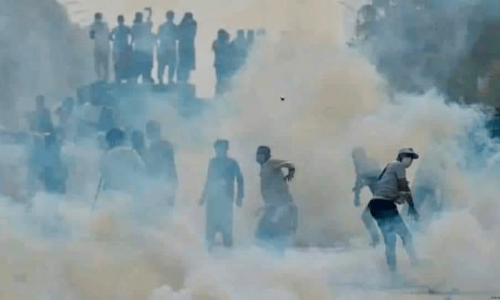DAKAR: Mamadou is a child beggar wandering the streets of Dakar, perilously darting in and out of traffic as he tries to gather enough money for his Islamic teacher to feed him.
But Mamadou is different from an estimated 30,000 boys who share his plight in Senegal. He is made of pixels, a virtual urchin created for mobile screens by app developer Ousseynou Khadim Beye.
Arcade-style gaming app Cross Dakar City was launched a year ago to great fanfare at home and abroad, setting 32-year-old Beye apart as the first Senegalese software designer to make it solo onto the charts of the Apple and Android stores.
And he featured a beggar boy for a reason. “I wanted to raise awareness by saying ‘this is not normal, we are not talking enough about it’,” he said.
His Mamadou is a talib, the Arabic word for student. In Senegal, boys as young as five are sent away from home to daras, or Quranic schools leaving them open to abuse. Some are forced — by their teachers — to beg on the streets to earn their board.
Child beggars remain so numerous in Senegal they pass unseen, despite government pledges to eradicate the problem by 2015.
“It’s a matter of being part of the decor. People are not really moved by that,” Beye said. “They think it’s normal.”
Often from poor rural families, the talibs are sent to the Senegalese capital Dakar and other cities to memorise the Quran, leaving them vulnerable to abuse and at times receiving little real education.

‘Apptivism’
The power of tradition in this west African state, however, means few are willing to challenge the teachers, given their status and respect as Islamic scholars.
Senegal has designated April 20 as the National Talib Day but rights workers say little has changed. The International Society for Human Rights (SDIH) marked this year by deploring the system as “a breeding ground for the sexual abuse of children”. In February, the Senegalese authorities found 20 boys aged between six and 14 kept in chains by their Islamic teacher or marabout.
So Beye decided to try a bit of “apptivisim” — creating a gaming app aimed at doing good. “My goal is to implement concrete actions for child beggars,” he said.
His virtual talib is vintage Senegal: he hops onto traditional “pirogue” boats to cross rivers and dodges rainbow-coloured “cars rapides” chugging along a virtual street.
The game has caught on and downloads keep rolling in. The Senegalese diaspora in France and the United States, notably, got hooked on this small, however sad, reminder of home.
“A lot of people told me they were so proud to see the first Senegalese game on the Apple store, and then that it also spoke to the subject of the talibs,” said Beye, who himself has set up as a software developer in the French city of Lyon.
Back home, “local media were talking about the video game and they were talking about it on TV,” he said.
‘Promises’
Buoyed by the success, Beye, who returns home regularly, approached children’s NGOs about opening a new chain of schools for talibs — but said the doors slammed in his face.
He next tried Unicef, the UN children’s agency, and was met with a sympathetic but firm “no”.
“They say they don’t have the budget ... they agree it’s a matter that’s been around for a very long time and every government that comes has their promises,” Beye said.
When contacted by AFP in Dakar, Unicef said providing education was not “the direct role” of the agency, which instead focuses on helping the government with policy change.
At his next ports of call, the government and Senegal’s ambassador to France, Beye said he got no response at all.
A government child protection strategy launched in 2012 aimed to eliminate child begging within three years but clearly “they are not taking effective action”, said Beye.
Others agree, like Unicef child protection specialist Yves Olivier Kassoka who decried the suffering and deprivation of many talibs, amid authorities’ reluctance to meddle with the powerful marabout.
“The daras which should be taking care of them are not in the condition of being able to do so,” he said.
While happy his downloads have hit the tens of thousands, Beye laments that he is no closer to rescuing a single child beggar. “I don’t have effective help,” he said. “[Parents] send their children far away; they do not know what they are doing every day.”
And on Senegal’s streets, shoeless talibs dressed in rags careen past indifferent police officers, brandishing the empty food tins they use to collect money, just as they always have.
Published in Dawn, May 10th, 2016















































Dear visitor, the comments section is undergoing an overhaul and will return soon.